|
|
|
Sort Order |
|
|
|
Items / Page
|
|
|
|
|
|
|
| Srl | Item |
| 1 |
ID:
087527


|
|
|
|
|
| Publication |
2009.
|
| Summary/Abstract |
The dawn of the new millennium has witnessed a renewed focus on power and security in the context of American primacy in global affairs. Today the United States of America (US) enjoys a position of power that was hitherto unknown by any one country. As the pre-eminence of US power animates the international landscape, several aspects of the resultant power asymmetries have prompted a fresh round of strategic thinking. It has sharpened the focus on the roots and evolution of the American worldview that shapes and guides the country's international policies. An appraisal of the worldview of the US today has significant implications for India, since Indo-US ties are in the process of deepening. The main questions that this article seeks to address are (i) what drives America's policies towards India, and (ii) how the changed worldview of America's security and power impacts Indo-US relations.
|
|
|
|
|
|
|
|
|
|
|
|
|
|
|
|
| 2 |
ID:
089815
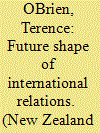

|
|
|
|
|
| Publication |
2009.
|
| Summary/Abstract |
This article reflects on the shape of 21st century world affairs. The impact of the current global financial crisis and economic crisis has exposed the inadequacies of international institutions. The traditional powers, whose negligence is largely responsible for the crisis, seem reluctant to share authority with the newly emergent economies upon whom the world must now rely for its recovery. The impacts of globalization, of greater militarization and weapons proliferation in international affairs, and of the dynamics of regionalism in international affairs, and of the dynamics of regionalism will all, however, shape a new hybrid order that will be more diverse and will require deeper understanding of forces like Islam that influence international relations. To be modern and successful in such a world, a country will not necessarily have to be Western.
|
|
|
|
|
|
|
|
|
|
|
|
|
|
|
|
| 3 |
ID:
103833
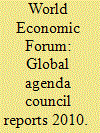

|
|
|
|
|
| Publication |
Geneva, World Economic Forum, 2010.
|
| Description |
358p.
|
|
|
|
|
|
|
|
|
|
|
|
Copies: C:1/I:0,R:0,Q:0
Circulation
| Accession# | Call# | Current Location | Status | Policy | Location |
| 055930 | 341.2322/WOR 055930 | Main | On Shelf | General | |
|
|
|
|
| 4 |
ID:
137495


|
|
|
|
|
| Summary/Abstract |
Its newly acquired status as the world's second largest economy has entitled China to a more prominent role in global affairs, and increasingly, its behavior has drawn scrutiny from the world in ways that the country is ill-prepared for. The attention to China's rise, however, focuses not only on its economy but also on other aspects, including its military, diplomatic moves, domestic politics and its ‘soft power’, namely, its own image or self-projection and the world's perception or attitudes toward China. And yet, there has been no systematic investigation to evaluate how the world views a rising China. In this article, the authors applied the latest dataset from the Asian Barometer Survey to investigate whether East Asians recognize and welcome the rise of China. The findings suggest that geographical and cultural proximity have a great impact on people's perception of China. Countries which are territorially adjacent or culturally close to China tend to regard China as the most influential country in Asia. With the exception of Japan and Mongolia, most Asian countries hold positive views about the impact of China on the region. However, such benign evaluations are weaker in countries which have potential security conflicts with China, such as Taiwan and South Korea, when only the bilateral impact is considered. The overall picture shows that the rise of China has been largely recognized and welcomed by East Asians, despite some apprehension about China's strategic intentions to its neighboring countries.
|
|
|
|
|
|
|
|
|
|
|
|
|
|
|
|
| 5 |
ID:
127014


|
|
|
|
|
| Publication |
2013.
|
| Summary/Abstract |
Diplomats are grappling today with a host of problems in a globalized world: countries are becoming increasingly linked; national boundaries have grown more porous; and borders between internal and external processes are disappearing. The foreign affairs of any country do not stand by themselves anymore, diplomats can no longer be guided exclusively by large-scale geopolitical plans or constructs. The development of any one country and the logic of how its central government is built hinges on the surrounding situation in the same way that the global situation depends on the decisions taken by large - and not so large - countries. And, of course, foreign policy professionals cannot be indifferent to events happening within their countries and to whether these events befit the international context or stand at odds with it.
|
|
|
|
|
|
|
|
|
|
|
|
|
|
|
|
| 6 |
ID:
128617
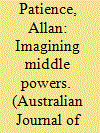

|
|
|
|
|
| Publication |
2014.
|
| Summary/Abstract |
Discussions of middle powers in international relations scholarship are hampered by a lack of clarity about what the term 'middle power' actually means. This has not stopped increasing numbers of states that cannot claim great power ranking but resist being categorised as small powers imagining middle power status for themselves in regional and global affairs. In an attempt to shed light on middle power imagining, three concepts of middle power are identified. It is contended that one or more of these concepts influences the foreign policies of states ambitious for middle power recognition in regional and global affairs. Identifying which concept, or which combination of concepts, influences a state's middle power imagining may contribute to deeper understandings of the effectiveness, or otherwise, of its foreign policies.
|
|
|
|
|
|
|
|
|
|
|
|
|
|
|
|
| 7 |
ID:
093318
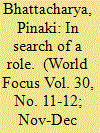

|
|
|
|
|
| Publication |
2009.
|
| Summary/Abstract |
In the penultimate year of the first decade of 21st century, India's foreign policy had do to deal with two influential forces.
|
|
|
|
|
|
|
|
|
|
|
|
|
|
|
|
| 8 |
ID:
159614


|
|
|
|
|
| Summary/Abstract |
Russia, nowadays, vigorously displays its strength in global affairs, which it could not do after the fall of the Union of Soviet Socialist Republics (USSR). Vladimir Putin and Dmitry Medvedev made this possible by recovering the country’s former standing and equitable place in the world arena. The country’s reemergence has resulted in growing confrontations with the West. The Russo-Georgian War and the Ukraine Crisis deeply worsened Russia-West relations. There are other differences on, for instance, Syrian war, expansion of North Atlantic Treaty Organization (NATO) and Venezuela. The United States’ presidential election 2016 has also allegations of Russian meddling. Russia is now trying to form new alliances at regional and global levels, including expansion of relations with depressed Western allies to counterbalance Western preponderance. Albeit Russia and West both suffer from economic slump, their belligerent rhetoric and military postures go on where neither is willing to give up. Russian reassertion and Russia-West antagonism sometimes create fear of full-scale conflicts. This article examines the reemergence of post-USSR Russia under Putin and Medvedev, mutual perceptions of and interactions between Russia and the West, Russia’s role as a global player in recent times, and if Russia’s resurgence will create new conflicts. It is a qualitative research, drawing from secondary sources. It mainly argues that there are reasons both for and against conflict, but neither Russia nor the West can endure a real war.
|
|
|
|
|
|
|
|
|
|
|
|
|
|
|
|
| 9 |
ID:
095512


|
|
|
|
|
| Publication |
Zurich, Centre for Security Studies, 2010.
|
| Description |
121P.
|
| Standard Number |
3905696266, pbk
|
|
|
|
|
|
|
|
|
|
|
|
Copies: C:1/I:0,R:0,Q:0
Circulation
| Accession# | Call# | Current Location | Status | Policy | Location |
| 054681 | 341.2322/MOC 054681 | Main | On Shelf | General | |
|
|
|
|
| 10 |
ID:
103815
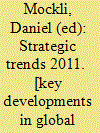

|
|
|
|
|
| Publication |
Zurich, Center for Security Studies, 2011.
|
| Description |
107p.
|
| Standard Number |
3905696312
|
|
|
|
|
|
|
|
|
|
|
|
Copies: C:1/I:0,R:0,Q:0
Circulation
| Accession# | Call# | Current Location | Status | Policy | Location |
| 055881 | 341.2333/MOC 055881 | Main | On Shelf | General | |
|
|
|
|
| 11 |
ID:
112585
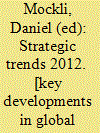

|
|
|
|
|
| Publication |
Zurich, Center for Security Studies, 2012.
|
| Description |
124p.Pbk
|
| Standard Number |
9783905696363
|
|
|
|
|
|
|
|
|
|
|
|
Copies: C:1/I:0,R:1,Q:0
Circulation
| Accession# | Call# | Current Location | Status | Policy | Location |
| 056511 | 341.2333/MOC 056511 | Main | On Shelf | Reference books | |
|
|
|
|
| 12 |
ID:
137469
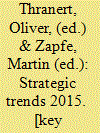

|
|
|
|
|
| Publication |
Zurich, Centre for Security Studies, 2015.
|
| Description |
98p.Pbk
|
| Standard Number |
9783905696486
|
|
|
|
|
|
|
|
|
|
|
|
Copies: C:1/I:0,R:0,Q:0
Circulation
| Accession# | Call# | Current Location | Status | Policy | Location |
| 058175 | 341.2333/THR 058175 | Main | On Shelf | General | |
|
|
|
|
| 13 |
ID:
102938
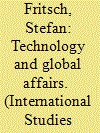

|
|
|
|
|
| Publication |
2011.
|
| Summary/Abstract |
Technology has always played an important role in global politics, economics, security, and culture. It has continuously shaped the structure of the global system, its actors, and the interactions between them and vice versa. However, theories of International Relations (IR), and in particular those of International Political Economy (IPE), have performed little to theoretically conceptualize technology as a powerful factor within explanations of change in global affairs. Although technology often is implicitly present in the theories of IR and IPE, it is often interpreted as an external, passive, apolitical, and residual factor. This essay argues that to develop a better understanding of transformation in global affairs, technology has to be integrated more systematically into the theoretical discussions of IR/IPE. Technology should be understood as a highly political and integral core component of the global system that shapes global affairs and itself is shaped by global economics, politics, and culture. This paper makes the case for an interdisciplinary approach, which systematically incorporates insights of Science and Technology Studies (S&TS) to provide a better understanding of how technology and the global system and politics interact with each other. In so doing, it opens the field to a richer understanding of how global systemic change is impacted by technology and how global politics, economics, and culture impact technological evolution.
|
|
|
|
|
|
|
|
|
|
|
|
|
|
|
|
|
|
|
|
|